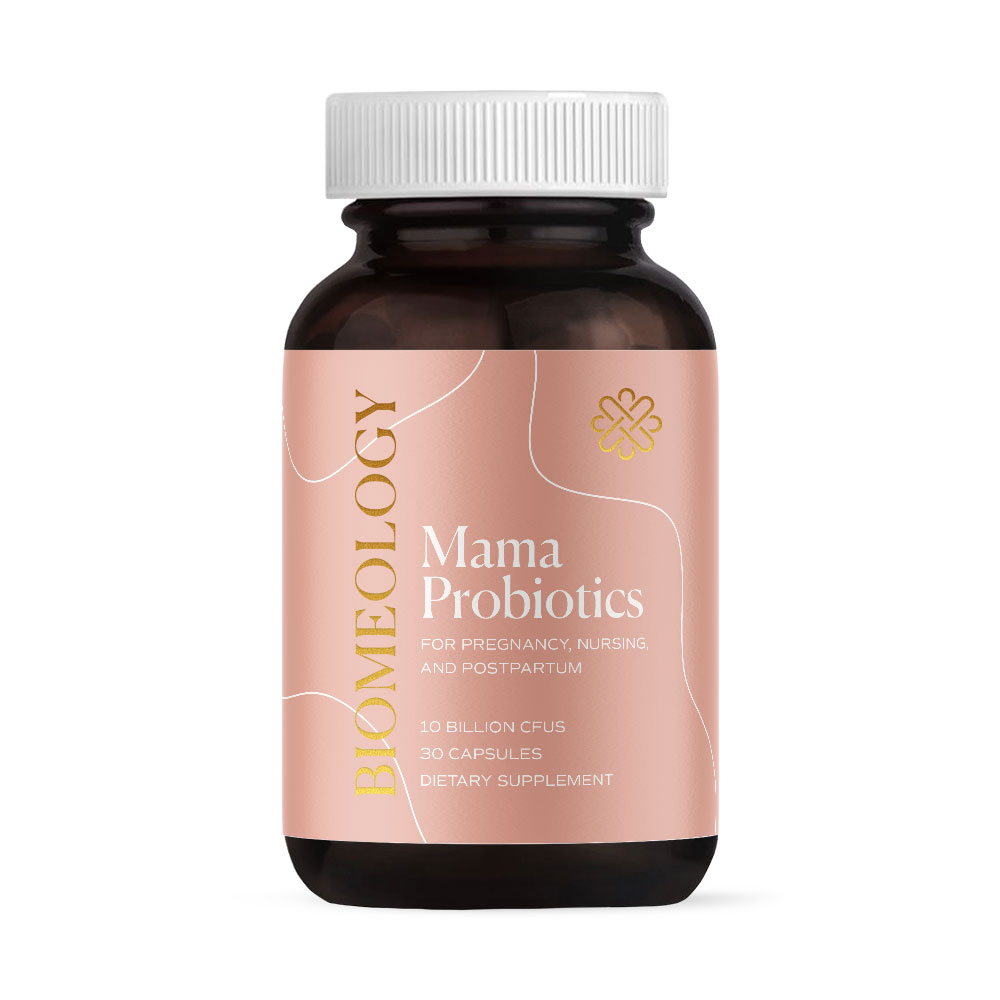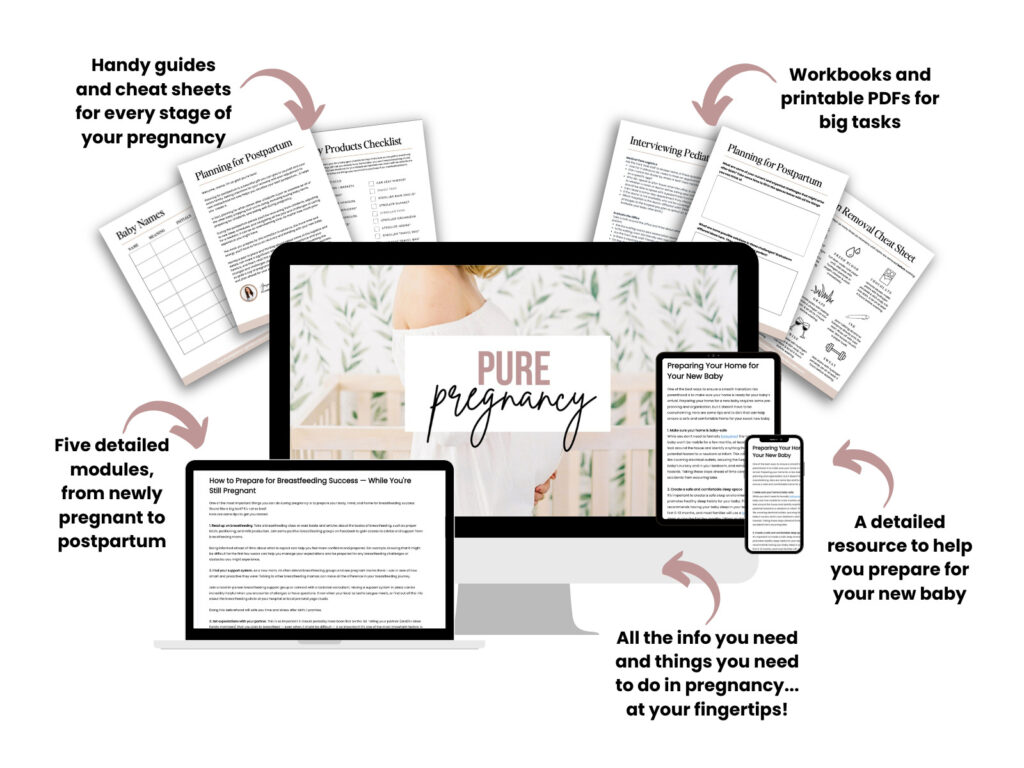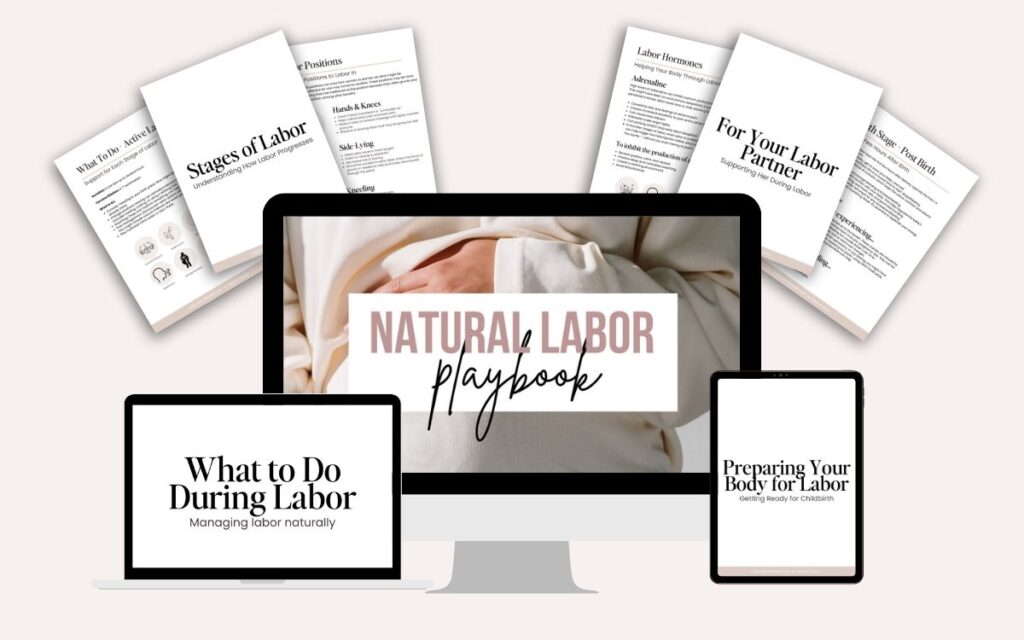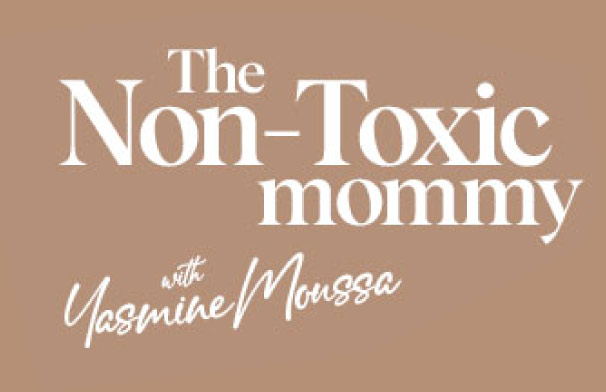One day, out of the blue, my husband turned to me and said he was ready to have a second baby. It was just what I had been waiting to hear.
So the first thing I did was schedule a doctor’s appointment to make sure I didn’t have any nutritional deficiencies or health issues that would need to be addressed. I wanted to make sure I was ready to have a healthy pregnancy and a healthy baby.
Thankfully, all of my tests came back normal so we started trying and pretty soon got pregnant.
But unfortunately, what my doctor didn’t know was that I had pretty poor gut health. And a month after birth, my son developed chronic eczema that lasted for over two years.
It also doesn’t help that I had to have antibiotics during labor because I had group B strep. This completely wiped out my microbiome and my baby’s. (Oh, the mama regrets I have.)
So, I did what every eczema parent does. I took him to doctor’s appointments. We saw specialists. I removed foods from my diet. I tried every remedy… steroid creams (ugh), oils, lotions, baths, vitamins, and even antibiotics (ughhhh) when it was at its worst. No product was left behind in my attempt to heal my baby’s eczema.
I was desperate. I was in total survival mode for a really long time. I was barely functioning. Eczema and food sensitivities robbed us of so many moments as a family. And stole so much joy from me as a mom.
What eventually cleared it up was a lot of gut healing – for both of us. Of course, I knew that gut health mattered, but I didn’t realize how it would affect my kids. My oldest son had reflux and also food sensitivities in his first year, too.
The realization that my gut health had affected both of my kids stopped me in my tracks. Major mom guilt.
I wish I had known better before I had gotten pregnant. That I had taken the time to heal and nourish my gut. Lesson learned.
My biggest advice to all future and expecting moms is to optimize your gut health before, during, and after pregnancy. It’s crucial for your wellbeing and your baby’s!
So I decided to make it my personal mission to spread this message. As a huge proponent of gut health, a functional nutrition coach, and the daughter of an integrative OBGYN, I’ve had lifelong training that brought me to this point. And I’ve made it my mission to spread the important message about optimizing gut health during pregnancy and breastfeeding.
My goal is to help moms and babies have better gut health so that they can thrive together. So that there’s less colic, reflux, group B strep, eczema, food sensitivities, antibiotics, behavioral issues, neurological disorders, and all of the health challenges facing families today—and more cuddles, fun times, and happy memories.
That’s why I created Biomeology and that’s why our first product is a Prenatal Probiotic. Because gut health begins long before birth.
Together with a team of doctors and microbiologists, I made this probiotic for you and your baby—because gut health is everything. And your gut health during pregnancy and while you’re breastfeeding? It’s everything to your baby.
Prenatal Probiotics

Biomeology Mama Probiotics
- Prenatal probiotics for before, during, and after pregnancy
- Safe for breastfeeding moms
- Six studied strains, including L Rhamnosus HN001
- Free from common allergens
How’s your microbial health, mama?
A healthy human body is home to trillions of microorganisms including bacteria, viruses, and fungi—both good and bad. Together, these organisms make up the human microbiome, which plays a massive role in the various organ systems in the body and affects nearly all aspects of human health.
(I will use terms like microbiome, microbiota, gut flora, gut health, and bacterial diversity interchangeably in this article. I like to mix it up!)
While different parts of your body have their own microbiome such as the skin, nasal cavity, and mouth, most of the bacterial community in the human body resides in the intestines. Often referred to as gut flora, these tiny organisms are responsible for breaking down your food, regulating your immune system, protecting you from opportunistic bacteria, and producing vitamins including B vitamins and vitamin K.
Everything from your immune health and brain health, your digestion and your skin health, to your energy level are all connected to the health of your microbiome. Your gut microbiota even play a regulatory role on anxiety, mood, cognition, and pain thanks to the gut-brain connection.
Can you see where I’m headed with this? Just imagine how this influences your pregnancy and your baby! We’ll get into that in just a second…
The ideal ratio of your gut flora is 85% good to 15% bad microorganisms, but it is extremely common for this balance to be disrupted. So if you’re like many mamas who live in a developed country, you may not have started out your pregnancy with perfect gut health. In fact, it is estimated that over 70% of Americans have digestive issues (and that figure is only growing).
But No One’s Talking About Gut Health During Pregnancy
I polled my readers and found that 73% didn’t even consider their gut health prior to or during pregnancy. As in—they didn’t give it a single thought.
As the daughter of an OBGYN, and someone who has committed herself to supporting other mamas during pregnancy and on their motherhood journey, it’s upsetting to me that this important information isn’t more widely discussed. I mean, everyone talks about how you shouldn’t eat sushi or deli meat during pregnancy, but how many people actually know the importance of gut health during pregnancy?
So, mama, let’s be realistic about your gut health so that we know what we’re working with.
Gut Check: Does Your Microbiome Need Some Attention?
Like many Americans, you may not have perfect gut health if:
- You have taken antibiotics or prescription medication in the past
- You eat a less-than-perfect diet and/or you aren’t getting enough dietary fiber
- You have dealt with chronic stress at some point in your life
- You have been sick before with a stomach virus or even food poisoning
- You were born by c-section
- Or you were formula-fed as a baby
All of these super-common things can affect your gut health, which can affect your baby’s digestive health, immune system, and brain development.
So how do you really know if you have compromised gut health? If you ever get constipation or diarrhea, have undigested food in your stools, or if you feel overly full or get gassy or bloated after you eat, you may have compromised gut health. Most of us grew up thinking these symptoms are pretty normal, but these are signs of poor digestion and compromised gut health. And in some women, they only occur during pregnancy, while others have had these issues long before getting pregnant.
Similarly, if you have an autoimmune disorder, eczema, allergies, mood disorders, brain fog, acne, frequent headaches, sugar cravings, chronic fatigue, or almost any other health issues, your gut needs some care and attention.
Don’t Stress About Your Gut Health
If you find yourself reading this and worrying, please don’t stress. Most Americans are working with some degree of compromised gut health. But to give our babies the best start in life, it’s important to address this as early as possible. When you know better, you can do better.
And, let’s be honest—stress is bad for you and it’s not good for your gut health, so that’s not going to help anything. Let’s just focus on what is within our control and take positive steps.
The Amazing Maternal Microbiome
Given how important the microbiome is to our health and to most organ systems in the body, can you imagine how it also plays an important role during pregnancy? Your microbiome plays a starring role in supporting your baby and your body through prenatal development. The importance of the maternal microbiome is completely understated.
Your Microbiome During Pregnancy
Early in pregnancy, the placental microbiome is established. Previously, science believed that the womb was a sterile environment, but research has shown that the placenta is home to a richly diverse microbiome, even in healthy pregnancies.
More research is needed on the maternal microbiome, including that of the cervix and amniotic cavity. But what we already know about the role of the microbiome during pregnancy is fascinating and empowering.
Here are six important ways the microbiome impacts your pregnancy.
1) Your gut flora play an essential role in absorbing and producing nutrients, which is crucial for fetal development.
You can eat the healthiest diet and take the best prenatal vitamins, but if your body can’t absorb and assimilate these nutrients, they won’t be able to do their job.
By having healthy bacteria in your system, and in the right balance, your body can better absorb nutrients from your food and your prenatal vitamins. And with optimal gut health, your body can also better produce its own nutrients, such as folate and other B vitamins, which are essential for the proper fetal and placental development.
For example, certain Bifidobacterium strains have been found to help support b-vitamin synthesis and produce folate in the body. Folate is essential before and during pregnancy to help prevent neural tube defects.
2) Your digestion slows down during pregnancy.
Due to the increase in progesterone and estrogen in your body, your digestion slows down as these hormones relax the muscles in the digestive tract. Weight from your growing baby can also add pressure to the digestive tract. All of these factors can cause constipation, bloating, heartburn, and other digestive issues—even nausea, vomiting, and hyperemesis gravidarum.
Prenatal probiotics, for example, can help keep you regular during pregnancy and ease some of the digestive upset that you experience as a result of these hormonal changes.
3) Pregnancy makes you more vulnerable to pathogens.
As you progress through your pregnancy, the composition of your microbiome changes from trimester to trimester. For example, the bacteria present in the gut increases in quantity and diversity with each passing month. As hormonal changes take effect during pregnancy and the composition of your microbiome changes, this also makes you more vulnerable to pathogens.
Regularly taking high-quality prenatal probiotics can help you maintain a healthy balance of bacteria in your gut and vaginal microbiomes, as well as throughout your body. This can help support your body’s immune and digestive health during pregnancy.
4) Microbial imbalances can contribute to pregnancy complications.
Maintaining a balanced microbiome during pregnancy can help reduce your risk of adverse pregnancy outcomes including spontaneous preterm delivery, gestational diabetes, excess weight gain, and preeclampsia.
A healthy vaginal microbiome, for example, reduces the risk of bacterial vaginosis and UTIs, which are risk factors for preterm birth and premature rupture of membranes. In fact, the risk of preterm birth doubles with a bacterial vaginosis (BV) diagnosis during pregnancy; BV is a state of vaginal dysbiois characterized by a reduction of Lactobacilli strains and an increase in pathogenic bacteria. (Interestingly enough, a study found that women who took oral probiotics to treat bacterial vaginosis had the lowest recurrence rate over the group who used antibiotics and the group who used vaginal probiotic suppositories.)
Gut bacteria may also be a source of infections in the uterus, which may also contribute to premature rupture of membranes. And oral microbial imbalances may contribute to preterm birth and pregnancy complications because they can cause uterine contractions or weaken fetal membranes. Periodontal diseases are also a major risk factor, increasing the risk of preterm birth 2-to-7 fold as well as being a risk factor for preeclampsia. Maintaining good oral health during pregnancy can help reduce these risks.
5) Your microbiome is a factor in whether you develop Gestational Diabetes Mellitus (GDM).
Women diagnosed with Gestational Diabetes Mellitus (GDM) tend to have less bacterial diversity.A study on the gut microbiome and metabolic changes during pregnancy found that in the first trimester, women who were later diagnosed with gestational diabetes had lower bacterial diversity. Thankfully, for mamas who are GDM+, having this condition did not negatively impact their child’s microbiota (though there are other risks to baby when mom has GD). However, this is a good reminder of the importance of taking care of your gut health before and during pregnancy.
Being GDM+ can increase the risk of complications such as pregnancy-induced hypertension and preeclampsia, which can increase the risk of cesarean delivery and other adverse outcomes. Preeclampsia can also increase the child’s future risk of developing type 2 diabetes.
6) Gestational weight gain is also influenced by gut bacteria.
Healthy weight gain during pregnancy helps support your baby and reduces the risk of c-section, hyperinsulinemia in infancy, metabolic syndrome during childhood, and even neurological conditions like autism. In addition to diet and genetic and environmental factors, the composition of the gut microbiome also plays a role in weight management during pregnancy. Women who have a greater concentration of Lactobacillus strains have less risk for excess weight gain, and their babies are less likely to be large for their gestational age at birth.
As you can see, a healthy bacterial environment during pregnancy can help in many ways during pregnancy. You can support your maternal microbiome by exercising during pregnancy, eating a healthy diet that is high in fiber, consuming prebiotic and fermented foods, taking fish oil, and taking a daily prenatal probiotic.
Let’s also talk about how your microbiome influences your baby’s lifelong health.
Your Baby’s Microbiome
For almost a hundred years, the womb was believed to be a sterile environment. But in 2014, microbiologists discovered that the placenta harbors bacteria that influence fetal health. So we now understand that microorganisms cross the placenta and that the mother’s microbiome directly colonizes her baby’s. But it may also be that babies’ guts are colonized in utero—which would be amazing!
Either way—these are big findings. This tells us that in addition to other factors, your gut health during pregnancy influences your baby’s health and development. In fact, a mother’s microbiome is so influential on her baby’s health that is believed to be a determining factor of life-long health.
Your baby’s gut flora will play a role in essential functions: providing a barrier against pathogens; digesting and metabolizing colostrum, breast milk, formula, and later solid foods; breaking down toxins; synthesizing vitamins; and developing and maintaining the immune system.
Your gut status during pregnancy has the potential to set your baby on a trajectory of good health or start them out with setbacks. Here are three fascinating facts about how your maternal microbiome influences your baby’s microbiome and long-term health.
Maternal microbiota represents the most important source of neonatal microbes.
–Garcia-Mantrana, et. al. 2019
1. Your microbiome is your baby’s microbiome.
In addition to bacteria that crosses the placenta during pregnancy, your baby also gets a swipe of your biome during birth. As your baby travels through the birthing canal, bacteria from your gut and vaginal microbiomes transfer to your baby. This initial passing on of bacteria is key to establishing your baby’s microbiome.
When a woman delivers via c-section, her baby will not get this beneficial exposure to their “pioneering” bacteria due to antibiotic use and the fact that her baby won’t pass through the birth canal. But, babies born via c-section will be exposed to the bacteria on mama’s skin. Be sure to practice skin-to-skin as soon as possible after birth and continue to work on your baby’s gut health after birth. You may also want to discuss the safety and risks of vaginal seeding with your doctor or midwife prior to your delivery.
Whether you deliver vaginally or via c-section, taking high-quality prenatal probiotics can help bolster your microbiome health and diversity.
2. Your microbiome programs your baby’s health—possibly for life.
A mom’s microbial status during pregnancy establishes her baby’s early microbial development and sets her baby’s health programming. If you have bacterial dysbiosis (an imbalance of gut bacteria), this will affect your baby’s early microbial status by poorly or adversely colonizing their body. Dysbiosis in the gut can also contribute to mental health issues and different mental states.
Poor colonization can lead to dysbiosis, which can cause other issues downstream, including immune-related pathogenic disorders. Factors that contribute to how your baby’s microbiome is colonized include delivery method (vaginal or c-section), exposure to antibiotics, and infant feeding methods (breastfeeding or formula).
3. Your microbiome influences your baby’s brain development.
Your baby’s gut flora influence immunological, endocrine, and neural pathways, playing a crucial role in their development.
In fact, a baby’s gut and brain form from the same tissue during embryogenesis, when the embryo is just beginning to form in early pregnancy. And during a child’s first two years—a critical period for early childhood development—the brain and the gut develop in tandem. The connection between the gut and the brain is so powerful and important, especially during early development.
There is a key reason that the gut is known as the second brain: the gut contains more than 100 billion neurons, and produces substances that influence the brain, including dopamine, serotonin, glutamate, and norepinephrine. The gut and brain are connected via the vagus nerve, which is key to the body’s immune system and inflammatory responses, as well as key functions such as hunger, elimination, and intestinal blood flow.
Can you just imagine how powerful and important your baby’s microbiome is? It not only sets the stage for your baby’s lifelong health, but it is a foundational part of your baby’s brain development.
Your Gut Health While Breastfeeding
The prevalence of asthma and allergic diseases is on the rise in children worldwide. Gastroesophageal reflux is also very common in babies, affecting approximately 50% of newborns.
Both of my kids had reflux as babies, and this made breastfeeding very challenging. After each nursing session, they would spit up, cry, or struggle with gas pains. I had to hold them upright after each feeding for 25 minutes, and this was exhausting, especially during late-night feeding sessions.
It got to the point where I was on a strict elimination diet. And with my baby who also had eczema, I wasn’t eating much more than 2-3 foods at one point. Yes, I said 2-3 foods. I felt helpless. (Of course, the bright side is that I did eventually clear up his skin!)
It turned out that I was dealing with intestinal permeability, aka leaky gut. The gut wall is supposed to protect foreign objects from entering the bloodstream; a leaky gut doesn’t have the same protection abilities and allows undigested proteins as well as myriad microbes, yeasts, and pathogens to enter the bloodstream. The immune system kicks in, and treats these like foreign invaders, causing havoc in your body. This puts your system on overdrive, especially if you continue to eat highly offending foods like dairy, soy, and gluten.
When a breastfeeding mom has an undernourished microbiome, this can trigger inflammation, reflux, eczema, colic, and more in her baby. Of course, that’s not to suggest that breastfeeding still isn’t the optimal way to feed a baby, even in this scenario. Rather, it is important to focus on eating well, living a healthy lifestyle, healing the gut, and providing healthy bacteria to her baby through breastmilk in the form of probiotic foods and supplements.
In fact, the first 1,000 days of your baby’s life—from conception to age 2—are going to be essential in establishing their lifelong microbiome and immune health.
The first 1,000 days provides a window of opportunity for modulating the microbiota through interventions such as diet, antibiotics, probiotics, prebiotics, or fecal microbiota transplantation to promote healthy growth and development.
– Robertson, et al. (2018)
This period of early childhood is also a critical time for brain development as synapses form. Given how influential the gastrointestinal system is on the central nervous system, your child’s microbiome plays an important part in early neurological development. For example, children on the autism spectrum are three times more likely to have frequent gastrointestinal problems such as frequent abdominal pain, pain during stooling, constipation, gassiness or bloating, diarrhea, sensitivity to foods, vomiting, and difficulty swallowing.
It is estimated that up to 30% of your baby’s microbial exposure comes from your breast milk and approximately 10% from the skin around the areola. It is important to continue passing a healthy bacterial mix to your baby through your breastmilk, and when you feel ready, for your baby to take a probiotic of their own.
Bacteria that originates in the mother’s gut is found to be more stable and persistent in the baby’s gut than bacteria that baby acquires from other sources. And mom’s gut bacteria is also the greatest source of microorganism transfer to her baby.
Remarkably, children at the age of 4 were found to have almost identical microbial makeup as their mother. Baby and mom’s microbiome resemble one another far beyond breastfeeding!
Another thing to consider is that it will likely take a few weeks for your gut flora to return back to normal after giving birth, and it may take longer for your vaginal flora or other parts of your body to recover. Be patient with yourself, but just know that you can help this process along by taking probiotics, exercising when ready, eating well, and consuming fermented foods.
Meet Biomeology
I learned about the importance of the maternal microbiome the hard way. I was diligent in everything I did during pregnancy, but I overlooked something so key to my baby’s health. And my own—my gut health.
After basically hitting rock-bottom dealing with my kids’ eczema, reflux, and food sensitivities, I set out to create a company that better supports the health of moms and babies.
For this reason, I spent over two years developing a probiotic just for moms. I worked with a team of doctors and microbiologists to create this for you and your little one.
Biomeology was created for you and your baby. Our first product is the prenatal and postnatal probiotic.
Biomeology Prenatal Probiotic — the #1 Probiotic for Pregnancy, Postpartum, and Breastfeeding
After so much time spent researching and formulating this probiotic, it is amazing to be able to share it with you!
We carefully crafted Biomeology Prenatal Probiotics to provide the right concentration of six key probiotic strains (including Lactobacillus Rhamnosus HN001) to help optimize your gut health and digestion during pregnancy.
We created this to help support your body and your baby through the many changes that you experience during pregnancy. And to help support your baby’s digestive and immune systems, as well as the healthy development of their skin.
Biomeology Prenatal Probiotic is for you if…
- You’re trying to conceive and want to prepare your body for pregnancy
- You’re planning on getting pregnant sometime soon and want to optimize your gut health
- You’re pregnant and want to balance your gut health or are dealing with pregnancy-related digestive issues like constipation or morning sickness
- You’re pregnant or nursing and want to expose your baby to strains that are linked to a reduction in eczema and food allergies
- You’re looking for a probiotic to support your changing body’s needs throughout pregnancy
- You have developed gestational diabetes mellitus or had it in previous pregnancies
- You have a family history of autoimmune disorders, eczema, asthma, or allergies
- You’re breastfeeding and want to pass healthy probiotics on to your baby through breastmilk
- You’re breastfeeding and want to address gut-related issues like colic
- You recently had a baby and are looking for mood-supporting probiotics and support for postpartum depression or anxiety
- You had antibiotics during labor (this is definitely for you)
Our Prenatal Probiotic is everything I wish I had in a probiotic when I was pregnant and nursing. And I am SO proud to have made it for you.
Six Targeted Probiotic Strains for Pregnancy and Breastfeeding
Biomeology Prenatal Probiotic contains six probiotic strains that we carefully selected for the benefits they offer to mama and baby. All of these strains have been heavily studied, have a long track record of use, and are generally regarded as safe.
Our unique formulation is effective yet designed to be gentle on your system. It is D-Lactate free and none of the strains included produce histamine.
Let’s go over each strain and their unique health benefits, as well as why they meet our stringent standards. We included two key Lactobacillus strains and four important Bifidobacterium strains.
1. Lactobacillus Rhamnosus HN001
L. rhamnosus HN001 is a powerhouse probiotic strain that has been clinically trialed in pregnant and breastfeeding women. This is the strain that I was desperately searching for when I was trying to clear my son’s eczema. It either wasn’t readily accessible, was part of a probiotic that contained other strains or ingredients I didn’t want to take, or the products I found simply didn’t contain enough of it.
L. rhamnosus HN001 is a non-spore-forming strain that we selected for the benefits it offers to mom and baby and for its ability to survive stomach acid and bile.
As one of the most common lactobacillus strains found in breastfed babies, L. rhamnosus HN001 has been consumed in cheeses for hundreds of years. (Fun fact: it was first isolated from cheese.)
One of the most promising benefits of L. rhamnosus HN001 is that it has shown to be a beneficial regulator of the immune system. It helps to strengthen the body’s natural defenses. And in the event that your immune system reacts to components that should not normally trigger an immune response (such as in the case of autoimmune diseases and allergies), the immune system should not be further stimulated.
This makes L. rhamnosus HN001 especially useful in the event that you have an autoimmune disorder yourself, or if you have a history of allergies or eczema in your family, making your baby at risk for atopy as well.
A randomized control trial explored the effects of L. rhamnosus HN001 supplementation on the prevalence of eczema in infants. Results showed that supplementation with this strain starting from the 35th week of gestation until 6 months of breastfeeding, followed by infant supplementation reduced the prevalence of eczema by 50%.
Oral supplementation with L. rhamnosus HN001 significantly reduces the growth of pathogenic bacteria like E. coli and S. aureus in the vagina. Also, an Italian double-blinded randomized research shows a marked reduction in Bacterial Vaginosis symptoms and incidence with L. rhamnosus supplementation.
And another study found that L. rhamnosus HN001 significantly reduces postpartum depression and anxiety in new mothers. The same study indicates that this probiotic strain may also be helpful in preventing postpartum depression and anxiety. Further research conducted on 423 women in New Zealand looked into the effects of HN001 supplementation on post-natal depression found a reduction in depression of 14% compared to the placebo.
Finally, this amazing strain has also been found to reduce the risk of gestational diabetes mellitus (GDM), particularly in high-risk pregnancies. Interestingly enough, having a depleted microbiome in the first trimester of pregnancy is correlated with having gestational diabetes. Early supplementation with HN001 may reduce the prevalence of GDM, particularly in women age 35 or older, and women who have a history of GDM in earlier pregnancies.
Children diagnosed with autism spectrum disorder (ASD) are one of the most common groups referred to pediatric gastroenterologists for GI symptoms. There is research linking the use of L. rhamnosus HN001 to improvements in autism and gastrointestinal issues in children diagnosed with ASD. To be clear, the research doesn’t link the use of L. rhamnosus HN001 during pregnancy to its effects on ASD, but there may be undocumented benefits to beginning this exposure at an early stage through mom’s breastmilk.
As you can see there are so many possibilities with such an effective strain. Lactobacillus Rhamnosus HN001 provides key benefits:
- Supports mom’s postpartum mental health
- Helps maintain healthy bacteria that may be essential to gestational diabetes prevention
- Supports baby’s healthy skin development
- Supports baby’s healthy gut and immune system development
- And supports baby’s neurological development
We have included L Rhamnosus HN001 as one of the main strains in Biomeology Prenatal Probiotics. As you can see, this powerhouse strain is perfect for pregnancy and postpartum!
2. Lactobacillus Acidophilus
Also widely studied, Lactobacillus acidophilus is a non-spore-forming strain that is commonly found in the mouth, vagina, and intestinal tract. With a long history of safety, L. acidophilus has also shown to be resistant to bile salts found in the small intestine and stomach acidity, meaning it will reach its final destination.
In combination with L. rhamnosus HN001, Lactobacillus acidophilus is another powerhouse strain for women’s health.
L. acidophilus is another powerful strain, especially for anyone who has an imbalanced gut from antibiotic use or chronic stress. In animal studies, it has been shown to be an effective regulator of microbial imbalances, remarkably increasing the ratio of good vs. bad bacteria. It is also a strong inhibitor of pathogens, including salmonella and staph, and also an effective inhibitor of listeria and e coli.
Lactobacillus strains are the predominant strains found in a healthy vaginal microbiome. Oral supplementation with Lactobacillus strains can help prevent the growth of pathogens in the vaginal tract, typically causing infections such as bacterial vaginosis and aerobic vaginitis. A study found that L. acidophilus, especially when combined with L. rhamnosus HN001, can be useful in preventing these vaginal infections which can cause adverse pregnancy complications.
In addition, L acidophilus can be beneficial for the overall modulation of the immune system. L Acidophilus strains may also play an important role in reducing the prevalence of eczema when taken during the last two months of pregnancy and through baby’s first 6 months of life.
This strain may improve immune system responses and can stimulate an anti-viral, anti-allergy, and anti-tumor type of response. This strain also strongly degrades oxalates, which can cause kidney stones, cardiomyopathy, and other disorders.
Lactobacillus Acidophilus is especially useful for:
- Maintaining healthy bacterial diversity
- Supporting vaginal health
- Maintaining healthy vaginal pH
- Promoting healthy vaginal microbiota
- Supporting immune health of mom and baby
- Maintaining oxalate balances
- Supporting skin health and development
There are many strains of L acidophilus, including some cheap and somewhat useless ones. We have only chosen high-quality strains and never use ANY filler strains.
3. Bifidobacterium Bifidum
Bifidobacteria represent the most abundant bacteria of the early human gut in healthy breastfed babies. These bacteria rapidly colonize the gut of infants during the first few weeks after birth, and are typically more abundant in breastfed babies. (Breastmilk is a key method of transfer for bifidobacteria from mom to baby.)
A high proportion of bifidobacteria in the intestinal tract is considered to be beneficial to one’s overall health. Bifidobacterium Bifidum is one of the most notable of these species. When transferred from mom to baby, it has been found to persist in the gut for up to one year.
B. bifidum has been shown to displace and inhibit pathogenic bacteria including Escherichia coli and Cronobacter sakazakii, which are frequent sources of gastrointestinal distress in babies. Taking B. bifidum during pregnancy may be key in establishing mom’s healthy bacterial community, which can be passed on to baby at birth and through breastfeeding, but more research is needed.
B. bifidum may be helpful with reducing overall inflammation, colon health, and the ability to absorb nutrients. It is also an important immune system regulator.
In combination with other key strains, B. bifidum can support baby’s healthy skin development. A randomized trial looked at 112 pregnant women with a history of allergic diseases and gave one group a placebo pill and another group a probiotic supplement including B. bifidum beginning 4-8 weeks before delivery. After birth, the mothers continued taking their placebo or probiotics for six months. Impressively, only 18.2% of babies in the probiotic group developed eczema while 40% of babies in the control group had eczema.
B. bifidum colonization may also be a factor in reducing a baby’s risk of necrotizing enterocolitis. Additionally, for mothers with a GDM diagnosis, this species may also provide additional support for inflammation and oxidative stress during pregnancy.
Bifidobacterium Bifidum can be useful for:
- Helping establish mom’s healthy bacteria during pregnancy
- Exposing baby to a key Bifidobacterium species
- Maintaining a healthy bacterial balance in babies
- Digestive support, including diarrhea and constipation
- Supporting baby’s healthy skin development
4. Bifidobacterium Infantis
Another member of the Bifidobacterium family, B. infantis is one of the most abundant probiotic strains found in the gut of healthy infants. But the presence of B infantis is significantly decreasing in babies born in developed countries due to common interventions such as antibiotics, formula-feeding, and c-section use.
Supplementation with this important species has been found to crowd out pathogenic bacteria that are associated with intestinal issues and immune-related disorders such as asthma, allergies, and autoimmune diseases.
Supplementing with B infantis is also linked to a decrease in inflammatory markers, indicating that it can be helpful with reducing inflammation in the gut. Reducing these key inflammatory markers and maintaining adequate levels of Bifidobacterium is also linked with a decrease in atopic diseases.
Also a key aspect of this strain is that B. infantis may reduce intestinal permeability and reduce the risk of necrotizing enterocolitis in infants.
Bifidobacterium Infantis can be useful for:
- Supporting the immune system
- Supporting healthy digestion
- Supporting baby’s healthy gut development
- Supporting healthy skin development
We made sure to include this important probiotic strain in our prenatal probiotics. By taking this during pregnancy and while breastfeeding, your baby can have added exposure to this important strain.
5. Bifidobacterium Lactis
Another member of the Bifidobacterium family, B. lactis is one of the most documented probiotics and has a long history of safe use.
B. lactis helps aid in healthy digestion and helps the body to absorb key minerals and vitamins, which is so important during gestation and breastfeeding. It has been shown to inhibit pathogens, enhance the immune system barrier, and support the body’s natural immune responses. It can also be helpful in improving bowel function.
One study found B lactis to help decrease the toxic effects of gluten on the body in celiac disease. And some studies have shown it to be a tumor inhibitor.
Bifidobacterium Lactis can be helpful with:
- Supporting healthy digestion
- Supporting healthy bowel function
- Inhibiting pathogens
- Restoring healthy microbial balance
6. Bifidobacterium Longum
Bifidobacterium longum is another important strain commonly found in healthy breastfed babies. It is one of the most abundant strains in a baby’s intestines and is regarded as a factor in disease-resistance in infancy.
B. longum has been widely studied for safety and has been shown to resist stomach acid and bile salts with significant survivability.
Most impressively, B. longum has shown to reduce the presence of harmful bacteria, improve intestinal flora, improve stool consistency, and have anti-allergy effects. B. longum supports immunity and helps establish balance in vaginal flora.
Taking B. longum orally during pregnancy and the postnatal period may also be instrumental in reducing the incidence of atopic dermatitis and eczema.
Bifidobacterium Longum may be helpful with:
- Intestinal inflammation
- Constipation
- Balancing intestinal and vaginal flora
- Seeding baby’s gut with healthy Bifidobacteria
- Modulating the immune system
- Supporting the body’s allergic responses
Together, these important strains were formulated into creating the best prenatal probiotic for women. Our probiotics are D-lactate free and histamine free, meaning that the strains do not produce D-lactic acid or excess histamine in the body and are suitable for more sensitive mamas.
What Makes Biomeology the Best Prenatal and Postnatal Probiotics for Moms?
After learning so much about the power and potential of probiotics, I knew that I wanted to create a better probiotic for moms and babies.
I grew tired of seeing so many babies developing eczema and cradle cap, or having food sensitivities and endless “colic”. So much of this originates from the microbiome, and we need to be caring for that before, during, and after pregnancy.
So I wanted to do things differently than other probiotic companies. Here’s how Biomeology is different than your run of the mill probiotic company.
1) Our probiotics are American made.
Our supplements are manufactured in a certified GMP facility and made in the USA. We do not use any ingredients from China or other sources we can’t trust—and we never will. (Some probiotics are entirely sourced from China.) Every strain and every ingredient is scrutinized. Just like you’ve come to expect from me!
2) We never use cheap filler probiotic strains.
We selected every strain in our prenatal probiotics for its history of safety, documented use, and for its unique characteristics. We said NO to using filler strains that would beef up our CFU count just to make it look more impressive. There are absolutely no filler strains in our product.
Many companies use cheap filler probiotic strains to boost their CFUs – and many times these strains provide little or no benefit. Some of these strains may produce histamine or D-lactate. We are far more careful and selective than that!
Every strain in our probiotics is an active strain chosen for a specific reason.
3) We purity test every single batch.
As a mom myself, and an advocate of healthy and non-toxic living, I know how important it is to make sure that your supplements don’t contain toxicants, metals, and contaminants. So we have made it a priority to have each batch of our probiotics third-party purity tested for arsenic, cadmium, lead, mercury, aluminum, nickel, titanium, thallium, yeast, mold, e.coli, salmonella, and more.
4) We use small-batch manufacturing.
This is somewhat rare in the supplement industry, but small-batch manufacturing gives us better manufacturing oversight and also allows us to avoid unnecessary ingredients like excipients and fillers. Since I created Biomeology to serve moms and babies, this is crucial to me. We won’t compromise on this, ever.
5) We label our probiotics honestly.
Unlike other companies, we guarantee the full potency of our probiotics (10 billion CFUs) at the time of expiration, not simply at the time of manufacturing. If you look closely at some other brands, you’ll find that they advertise 5 or 10 billion CFUs but only guarantee a fraction of that amount when the product expires.
That’s not my style. We don’t follow this confusing practice – our label lists the minimum CFUs you are guaranteed at expiration.
6) We refuse to store our products in a hot storage facility.
Our probiotics are shelf stable, but I wasn’t comfortable with using a storage facility that doesn’t even have air conditioning, like some of the common fulfillment centers. Instead, we store our probiotics in a refrigerated fulfillment center, which helps maintain the potency of our probiotics. For example, most warehouses can reach as high as 100 degrees during summertime! While our probiotics are shelf stable, this is not an optimal environment for any supplements—especially probiotics.
This comes at an extra cost but I feel this is important to retain the integrity of the probiotics and deliver the most CFUs to our customers. Anytime you order our probiotics, you can rest assured that they will ship to you from our refrigerated warehouse. And know that they haven’t been sitting in a hot and stuffy warehouse for months on end.
We offer fast, free shipping from our refrigerated warehouse—whether you order from our site or from Amazon.
7) Our prenatal probiotics were optimized for pregnancy.
I’m the daughter of an OBGYN and a mom of two boys. I’ve also made my fair share of mistakes when it comes to my own pregnancies, so I know how precious a baby’s time is in the womb.
Taking into consideration the body’s needs during pregnancy, we wanted to make our prenatal probiotics the best in the world. We developed this formula to be gentle on mom and baby but still effective. You won’t find any spore-forming strains in our probiotics. Nor will you find soil-based strains.
And we didn’t cut any corners. We put in a significant concentration of the expensive strains like Lactobacillus Rhamnosus HN001, which has been studied extensively for its benefits during pregnancy and lactation. We chose the best strains and didn’t hold back.
Together with my team of doctors, microbiologists, and probiotic researchers, I created Biomeology to be the company I wish I had access to during both of my pregnancies. This product (and every future product we’ll release) meets my high product standards. And as you know if you’re a regular reader of this site, when it comes to pregnancy and babies, I take chemicals, ingredients, and manufacturing very seriously.
Support Your Baby and Your Body Through Pregnancy and Breastfeeding
Together with a healthy diet and lifestyle, the right probiotics can help support your body and your baby’s during pregnancy and postpartum. By choosing Biomeology Prenatal Probiotics for before, during, and after pregnancy, you can help support your microbiome and your baby’s.
Order your bottle on Amazon now!
Biomeology Prenatal Probiotics
Formulated by a doctor and a team of microbiologists, Biomeology Prenatal Probiotics contains six key strains to support you and your baby before, during, and after pregnancy. D-lactate free and histamine neutral. Ships from a refrigerated warehouse.
Want more support during your pregnancy?
Join PURE Pregnancy, my holistic pregnancy guide. Have your best, most prepared pregnancy… starting today!











What are some of your favorite probiotics for kiddos? Like 2 years and older?
Thanks
Hi! We have an amazing infant and toddler probiotic. I give this to both of my kids (age 4 and 7). https://www.amazon.com/Biomeology-Infant-Probiotic-Powder-Toddler/dp/B08MT2FHRJ